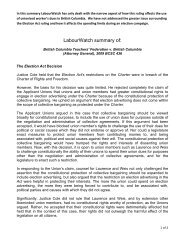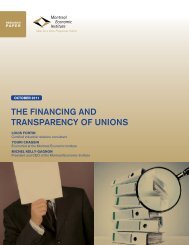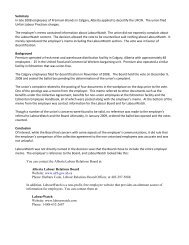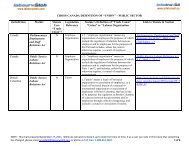We're not anti-union, just pro-employee - LabourWatch
We're not anti-union, just pro-employee - LabourWatch
We're not anti-union, just pro-employee - LabourWatch
Create successful ePaper yourself
Turn your PDF publications into a flip-book with our unique Google optimized e-Paper software.
In this exclusive series, National Post looks at the role of <strong>union</strong>s in the Canadian workplace.<br />
Much of the content is based on a poll of Canadians commissioned by the Canadian <strong>LabourWatch</strong><br />
Association and conducted this August by Leger Marketing. The series ran September 2 to 5, 2003.<br />
<strong>We're</strong> <strong>not</strong> <strong>anti</strong>-<strong>union</strong>, <strong>just</strong> <strong>pro</strong>-<strong>employee</strong><br />
John Mortimer<br />
National Post – Page FP15 – September 15, 2003<br />
Ken Georgetti, like most <strong>union</strong> leaders, labels as "<strong>anti</strong>-<strong>union</strong>" any organization<br />
communicating a more complete legal picture of <strong>union</strong>ization. He complains in his Sept. 9<br />
article that the Post "fails to identify" the "unknown '<strong>LabourWatch</strong>.' " Yes, the Post hid its<br />
reference to <strong>LabourWatch</strong> -- on its front page!<br />
What is truly unknown is the difficult <strong>pro</strong>cesses and issues facing <strong>pro</strong>-choice <strong>employee</strong>s<br />
w<strong>anti</strong>ng to make more informed decisions about <strong>union</strong>ization, let alone <strong>employee</strong>s w<strong>anti</strong>ng<br />
to be <strong>union</strong>-free. We'll continue to help <strong>employee</strong>s looking for information on <strong>union</strong>ization<br />
and legal <strong>pro</strong>cesses available to them, despite <strong>union</strong>s and their lawyers opposing such<br />
informed <strong>employee</strong> debate.<br />
Mr. Georgetti calls us "laughably partisan." He doesn't like our members -- business<br />
associations whose member's employ millions (whether <strong>union</strong>ized or <strong>not</strong>). Nor does he like<br />
our member law firms, some of whom act for <strong>employee</strong>s; most of whom act for employers.<br />
Both help <strong>employee</strong>s get a fuller picture of <strong>union</strong>ization law than <strong>union</strong>s or labour boards<br />
<strong>pro</strong>vide.<br />
Mr. Georgetti points to the content of labourwatch.com -- specifically, our explanations of<br />
key legal rights and responsibilities. For example, the various statutes include <strong>pro</strong>visions for<br />
<strong>employee</strong>s to decertify their <strong>union</strong>. Employees may cancel cards or signatures on a petition<br />
in a <strong>union</strong> drive. What he calls <strong>anti</strong>-<strong>union</strong>, we call <strong>pro</strong>-<strong>employee</strong> choice and allowed under<br />
the law.<br />
Union lawyers, who have argued against <strong>employee</strong> access to our content before labour<br />
boards, share Mr. Georgetti's disdain for our information and downloads. The reality is that<br />
<strong>LabourWatch</strong> increasingly resonates with both <strong>union</strong> and non-<strong>union</strong> <strong>employee</strong>s because we<br />
<strong>pro</strong>vide access to government forms and explanations on associated filing <strong>pro</strong>cesses --<br />
information no <strong>union</strong> <strong>pro</strong>vides and no labour board completely <strong>pro</strong>vides.<br />
Why do our "great democrats" oppose informed <strong>employee</strong>s and secret ballot votes Why<br />
must <strong>employee</strong>s deciding about <strong>union</strong>ization face a <strong>union</strong> with financial resources, paid<br />
<strong>pro</strong>fessionals and nearly unfettered free speech while the employer has more limited free<br />
speech rights, and in some jurisdictions, virtually no room to speak without serious<br />
consequences How are <strong>employee</strong>s to make a truly informed decision Not easily or <strong>not</strong> at<br />
all is their reality.<br />
1
We believe <strong>employee</strong>s w<strong>anti</strong>ng to be <strong>union</strong>-free are at the most significant disadvantage.<br />
One of our goals is to help these <strong>employee</strong>s, in practical terms, through our Web site's<br />
resources. More generally, we are raising the <strong>pro</strong>file of the structural disadvantage that<br />
Canada's labour law regime and its day-to-day application by labour boards places on its<br />
subjects.<br />
Mr. Georgetti selectively quotes our Web site's Introduction. The rest of the sentence, after<br />
"strives to be neutral" reads, "in its message by being factual and never attacking <strong>union</strong>s,<br />
employers or governments in our explanations of labour law." We go on to say: "The goal<br />
of our site is to bring balance to the labour relations information Canadians can access on<br />
the Internet ..."<br />
Further, we refer <strong>employee</strong>s interested in <strong>union</strong>ization to the "excellent" <strong>union</strong> Web sites<br />
run by Canada's "dedicated <strong>union</strong> leaders." We have a live link to Mr. Georgetti's CLC Web<br />
site along with every other <strong>pro</strong>vincial federation of labour and their growing nemesis, the<br />
Christian Labour Association of Canada.<br />
Mr. Georgetti also complains that he couldn't get more information about the poll itself<br />
(methodology, questions asked and full poll results). The methodology was posted all week<br />
on the National Post's Web site.<br />
The full 43-page analysis by Leger Marketing, of the poll they conducted, was posted on<br />
Sept. 5, the last day of the series, along with the full questionnaire. He implies that the<br />
questions were cooked. We think he should have read the questions (he says he couldn't<br />
find) before reaching his finding.<br />
After the exclusive release period for the National Post and Global National News,<br />
<strong>LabourWatch</strong> posted the above documents on its Web site. No CLC request was made of<br />
<strong>LabourWatch</strong> for copies.<br />
Mr. Georgetti criticizes the lack of quotes from the pollster's spokespersons. Leger did<br />
media interviews with those who contacted them. He and Buzz Hargrove "reject" the poll's<br />
results, even if most of the results come from currently or formerly <strong>union</strong>ized Canadians.<br />
Mr. Georgetti, whose article relied upon one example of an alleged wrong by an employer,<br />
is aware of the rising tide of "duty of fair representation" complaints against <strong>union</strong>s. Our inbox<br />
is full of stories of <strong>union</strong>ized <strong>employee</strong>s upset about or expelled from their <strong>union</strong> for<br />
any number of reasons. No one hid the favourable results in some areas regarding <strong>union</strong>s<br />
in the series or the full report. When one looks carefully, however, you will find those weak<br />
by comparison to results that <strong>union</strong> leaders reject.<br />
At <strong>LabourWatch</strong>, we look forward to an increasingly informed debate on the realities that<br />
taxpaying <strong>employee</strong>s face when making decisions about <strong>union</strong>ization. For their benefit, for<br />
a more effective <strong>union</strong> movement and for a stronger economy, we look forward to<br />
legislative change that brings about a level playing field.<br />
John Mortimer is president of the Canadian Labour Watch Association.<br />
© Copyright 2003 National Post<br />
2







